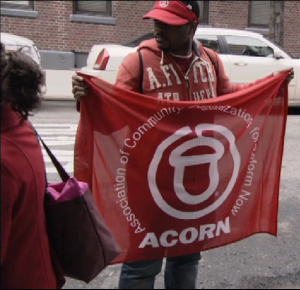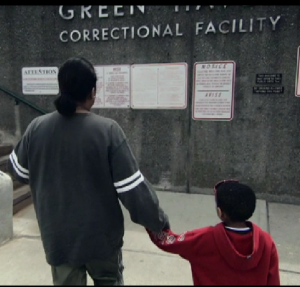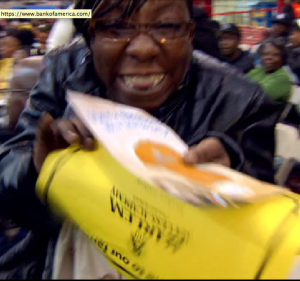“The Lottery” is a documentary that follows four different families with the focus on four children, Eric Jr., Greg Jr., Christian, and Ameenah. Through the lens of these children, the film tracks their hopes of being admitted into a local charter school Harlem Success Academy through luck of the lottery. The film presents the knowledge of these individual children as well as the parents desires to send their children to an excellent school, which they believe is Harlem Success. It intertwines these personal stories with interviews that demonstrate the benefits of charter schools as well as the debate and controversy surrounding charter schools.
A movie review by the New York Times, highly criticizes the film “The Lottery”. In fact, the review critiques, “With a little tweaking “The Lottery” would fit nicely into the marketing materials for the Harlem Success Academy”.[1] The review continues to group this documentary with others such as “Cartel” for advocating for charter schools. However, unlike some other documentaries like “Cartel”, “The Lottery” pulls at the heartstrings of the viewer, hoping to convince people that more charter schools are needed.
In concordance with the New York Times review of the movie, the filmmaker makes very little effort to hide the support of charter schools. The movie comments on the ever-pressing achievement gap between white students and black students as well as the achievement of white students and Hispanic students. Without blatantly or directly stating that charter schools will fix this issue, the film actually comments on the importance of a good school, the value of motivated teachers, and the influence of parenting and the family life on a student’s performance. The filmmaker obviously believes that a good school consists of engaged teachers who can stimulate their students, while also having a strong support system of the family. In fact, the movie even states that it is not the children who fail the system, but rather it is the system that fails the children because all children are capable of learning.
The film also addresses some of the problems that public schools face. Through an interview of a principal at a local public school in Harlem, the bureaucracy that “saddles” the public school system, as Eva Moskowitz calls it, is presented. However, the film is making an attempt to not be completely biased by getting her opinion. Furthermore, Ms. Moskowitz comments on the issue with teachers unions and tenure. She argues that public schools have difficulty firing teachers that are not qualified or good teachers while at the same time insinuates that Harlem Success Academy is so successful because they can fire poor teachers without the bureaucratic process.

The filmmaker uses a taped interview with Charlie Rose and the speaker for the Teachers Union as well as statistics to drive this point home.[2]
A direct consequence of the Teachers Union that Ms. Moskowitz argues against is that it prevents the collaboration of teachers, principals, and other people of authority such as herself to improve their teaching skills. In order to be able to participate in this engagement of collaboration though, Ms. Moskowitz feels it is necessary to be able to observe the teachers in their classroom, especially unannounced. However, public schools do not have that privilege because the Teachers Union prevents unannounced observations of teachers.
Continuing with the theme of playing on the emotions of the viewers, the principal of the Harlem Success Academy speaks of the public school where he formerly worked. To add to the dramatics, the principal tears up while he speaks of the poor conditions of the school and as a result the system failing the children he taught.

To contrast all the promotion for charter schools, the film interviews the members of ACORN who were outsourced by the Teachers Union to help rally against Harlem Success Academy 2 take over the building of a current public school in Harlem.[3]

Furthermore, the film shows part of a “space hearing” that was held in regards to Harlem Success Academy 2 replacing the local public school. Some of the mothers and families of the children who attend the local neighborhood public school feel very passionately against shutting down the public school and replacing it with a charter school. [4] The argument against the Harlem Success Academy 2 is not necessarily an argument about public school v. charter school but rather it is not necessary to close the neighborhood pubic school in order to create a new charter school.
However, it quickly moves back to appealing to people’s hearts with the scene of Greg Jr. going to visit his dad at the correctional facility.

Through segments of an interview with Greg Sr., the father of Greg Jr., he comments on the importance of education and how it may have prevented him from being where he is today. [5] He also reflects on the motto of the Harlem Success Academy of telling the children that their goal is to be a college graduate and says, that in his entire life he has never been told that, which is a powerful thing.
The interview with Greg Sr. is paired with an interview of a Harlem Success parent, Karl Willingham, who speaks of the greatness of the charter school. He says, “Do you remember when you were a child and you wanted to be an astronaut or a scientist or president of the United States and you couldn’t because no one taught you which direction to go to get there. So wanting to be an astronaut seemed as far away as the moon which, um, its really no that far but no one told you that and you just don’t want to see anyone else miss out because no one told them they could have it”.[6] This scene is very powerful because its asking a parent if they want to take away the dreams of their children, while also insinuating that charter schools are the way to put them on the path to the dreams because the public schools will fail them.

The last scene of the movie before recapping what the future holds for each child that they followed it the actual lottery. It is not possible to not tear up during this scene unless you are heartless and do not want any child to have a future. [7] That’s the power of the film, it convinces the audience that these kids will not have a future by going through the local public school system, they need to attend a charter school in order to achieve success in their life. The excitement expressed by the mother of Ameenah is relief and hope and confidence all raveled into one that her daughter will now have the best life possible for her because she will be attending Harlem Success Academy.
The film obviously advocates for the education reform movement of choice through the creation of charter schools. Besides addressing the flaw of charter schools taking the place of neighborhood public schools, the film fails to address any other flaws of the charter schools. For instance, it never addresses any of the statistics that state charter schools are not always more successful than the local public school. However, the film does do a rather impressive job of addressing the perspective of the children, the parents, the teachers, the members of the Teachers Union, and the principals. On the other hand, most of these people are advocates for charter schools.
[1] Jeannette Catsoulis, “Education by Chance”, New York Times, June, 10, 2010, accessed February 19, 2013, http://movies.nytimes.com/2010/06/11/movies/11lottery.html?_r=0.
[2] The Lottery, directed by Madeleine Sackler (2010; Variance Films), 0:20:49.
[3] The Lottery, 0:26:28.
[4] The Lottery, 0:32:58.
[5] The Lottery, 0:42:09.
[6] The Lottery, 0:55:55-0:56:53.
[7] The Lottery, 1:11:44.
“It is not the children who fail the system, but rather it is the system that fails the children because all children are capable of learning”. This quote correlates with some of the main themes of my assigned documentary, Race to Nowhere. The director, Vicki Abeles, focuses on how the flaws of our school systems are causing mental and emotional damage to our students. She shows how in schools today, there is a false type of learning going on. Students are not truly absorbing and understanding the given information because they are simply memorizing it just for the test and then forgetting it the second the test is over. They also cannot engage their creativity and ability to critically think, even though all students have the capability to do so. Teachers are overstuffing lesson plans with too much information, and therefore assigning hours upon hours of homework to make sure students can cram it all in their heads before the test. This test-obsessed system is setting kids up for not only emotional issues like stress, but also for failure. One very bright student Abeles featured in the documentary felt so much pressure to get good grades that he considered giving up and dropping out of school after one failed class. If the system does not change, many more students will feel these emotional and mental consequences and potentially give in to failure.
This video analysis makes a compelling case for why The Lottery, despite criticisms that it resembles marketing materials, nevertheless packages together several key scenes that pull at the heartstrings of viewers and lead them to empathize with the plight of students seeking enrollment into selected charter schools.